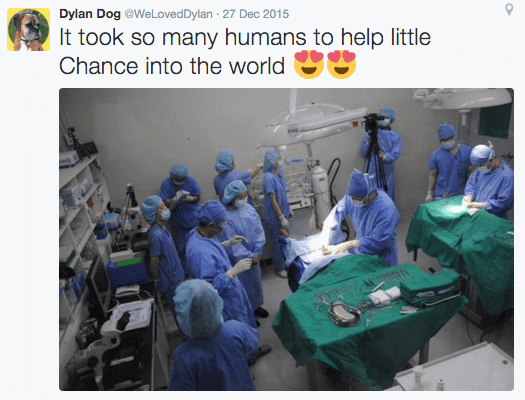
I read something in the news the other week: I have a lot of conflicting feelings about it, which makes me really uncomfortable. Since I try to grok those kinds of conflicting-feelings issues on this site, I think I need to grok this out with all of you.
The story was about a British couple who paid somewhere near $100,000 to clone their dog, Dylan, who died when he was 8. In what many thought was a scientific impossibility (or at least highly improbable), almost two weeks* after this couple’s beloved dog died, DNA was isolated from him and the couple now has not one but two brand new puppies made from the exact DNA as their dead dog. (Typically, DNA needs to be isolated earlier to successfully clone – the earlier record was five days after death. Various reports on this story say that in this case, it was either twelve days or two weeks after Dylan died.)
Yup. You can do that.
The company that did it is a South Korean company called Sooam Biotech Research Foundation and they have cloned several hundred dogs over the last decade, one article states. The first puppy’s name is Chance and it was born via C-section. The second puppy’s name is Shadow and it was born naturally (if that word can even be used here?!) by a surrogate dog who carried the baby.
So the genetics are exactly the same as their original dog whom they loved and miss very much (and on whose behalf they continue to tweet at @WeLovedDylan). The environment will determine how much these new puppies (who also have Twitter accounts at @ShadowisMyTwin and @ChanceisMyTwin) “act” like their old dog, as genetics is just one part of what makes us us; if you’ve ever know identical twins, you know that they are often very very similar but there are indeed differences!
Before I explore the issues about this that are on my mind, I need to state the following because if I don’t, I might be accused of being a scrooge-y killjoy for even discussing the complexity of this issue: I am happy for this couple. I am happy they are happy and I hope the dogs live long and beautiful lives.
So what is on my mind about this?
Is this Science or Science Fiction?
The science of this is unbelievable. This is the technology that science fiction has dreamed about for decades. As someone who is trained in Neuroscience in a genetics lab for part of my graduate studies, I find the new world of genetics and cloning to be phenomenal. It’s amazing. But it’s also scary.
The possibilities are potentially really scary. The movie “The Matrix” shows us what armies of clones would look like and Star Wars Episode 2 also shows the “Attack of the Clones.” We who are science-minded tend to worry about the implications of cloning mammals. What would it look like if people start cloning their children? Their spouses? Their mothers-in-law?!
In all seriousness, a world where we clone things because we want to and because we can is something that in a “free” democratic country, we technically have the right to do. But it could get out of control – so is there a limit to what we can and should do? What are our responsibilities to the implications of what we do because we can?
Was it a Good Use of Financial and Medical Resources?
The thing that I feel most conflicted about reading about Dylan’s clones is the amount of resources used to make this happen. Not just the $100,000, which I will get to in a minute. But the pictures of the operating room (see below) where the first puppy was taken out of its surrogate mother’s belly by C-section looked startlingly like the operating rooms and C-section teams that humans use. Doctors in scrubs and a team of nurses and expensive equipment created a picture straight out of your average Western hospital.
Because I am the kind of person I am – the kind who wants to grok these kinds of things – I went to this place in my head:
I thought about all of the women, domestically and worldwide, who have no access to good medical care during pregnancy and who may even die in childbirth because they can’t get to a hospital safely.
I thought about all of the women whose babies die during childbirth because there is no sterile equipment for them during labor.
I thought about all of the young women who give birth with no partner with them who need someone to hold their hand while they labor.
Money can give women access to medical care. Money can help women in childbirth and money can help their babies. Money can staff facilities with people who can support women in labor, especially those who don’t have a spouse with them.
My grokking brain didn’t stop there, though.
I thought about the children in this country and in every country who don’t even eat two meals or even one meal a day, let alone three square meals like so many of us are used to. I thought about the children around the world and their families who don’t have access to safe water to drink. I thought about the children who have no clothing to go to school in and thus don’t get to go to school and get an education.
I thought about my children, who complain if their “favorite” pair of pants are in the wash. And I thought about all of the toys they have, even though I try not to be the mom who buys her kids everything they want.
I was still thinking about it all and I got a holiday card from a charity I support called Bet Tzedek, which means House of Justice. Bet Tzedek is a non-profit that provides free legal services to the destitute, to the mentally ill, to the unrepresented, and to those the legal system leaves behind. It started as an organization dedicated to helping Holocaust survivors defend themselves against discrimination and illegal policing when they had no resources to do so.
Bet Tzedek’s holiday card showed pictures of children who attended their holiday party. The children’s faces had been painted like butterflies and animals. They were smiling. These children have no legal guardians, which means their parent or parents are either deceased or unfit to take care of them (because they are in prison, or mentally ill, or have been deported from this country). It’s unimaginable. But every year, Bet Tzedek hosts them for a holiday party where they can have their faces painted and have a fleeting but meaningful experience of joy, of someone caring for them, of someone giving a damn about their lives.
As I looked at this holiday card from Bet Tzedek, I thought about Dylan, the dog this couple cloned. Twice. And I thought about how much I love my cat. And how I totally completely 1000% understand the desire to clone a pet.
But then I wondered what $100,000 could do for Bet Tzedek. Or for children who have no legal guardian. Or for children who have nothing to eat because their family lives in poverty or because they are homeless and it’s not a child’s fault that their family lives in poverty or is homeless.
I wondered what $100,000 would do for women’s clinics in Britain. In Africa. In Asia. All over Europe. In North America. Is there any women’s clinic that doesn’t need $100,000?
And then I felt bad. Because I wish I could be the kind of person to just think it’s so cool to clone a dog and say, “It’s a free country, this is democracy, they can do what they want!”
In the fantasy country I rule in my brain, I wouldn’t let people use their money like this until every child could eat three meals a day, and until every woman had access to sterile birth equipment, and until every human on this planet had access to clean drinking water. But that’s my fantasy. I know that’s not how it works in the real world. And it is their money, and their choice.
But I can’t turn off my conflicting feelings. So I’m bringing them to you. What do you think?
Grok With Us:
- If you had the resources and the technology to do so, would you clone a pet or a loved one? Why or why not?
- Should there be regulations for cloning animals?
- Is the hallmark of a free country the ability to spend money however we want? What are the implications of that?
- Do you remember the last time someone you know spent money on something you thought was unimportant? Did you express your opinion? How did that go?
- How can we make more people care about issues we think are important as opposed to spending it on things we may not think are important? Is that something we should do as civilians, or that the government should regulate, or is it none of our business?
- Is there a hierarchy of importance for how we spend money? Should we spend on family first, then friends, then pets? Should we take care of the world’s humans first and then its animals?





 Read More From Mayim
Read More From Mayim
Grok Nation Comment Policy
We welcome thoughtful, grokky comments—keep your negativity and spam to yourself. Please read our Comment Policy before commenting.